dare作情态动词和实义动词的用法区别
dare的用法和短语例句

dare的用法和短语例句【篇一】dare的用法dare的用法1:dare用作实义动词时,有时态和人称的变化,用do, does或did来构成否定句或疑问句。
dare的用法2:dare作“敢”解时,指“勇敢”,含有大胆、鲁莽、爱冒险,或因爱慕虚荣而甘冒生命或受惩罚的危险的意味,后面通常接动词不定式,有时可省略不定式符号to。
一般不用于进行体。
dare的用法3:dare还有“激某人做难办的事”的意思,即问某人敢不敢(或能不能)做某事,暗示他不敢(或不能),其后接以动词不定式充当补足语的复合宾语,不定式中的to 一般不省略。
dare的用法4:dare还可作“冒险,面对危难而不畏惧”解,直接接宾语,这是不常见的用法。
dare的用法5:dare用作情态动词,一般用于疑问句、否定句或条件句,或与hardly, never, no one, nobody等连用。
有时态变化,但没有人称形式的变化,其后接动词原形。
构成疑问句和否定句时不用助动词do。
dare的用法6:dare的否定式有时可用来指过去的事情。
dare的用法7:现代英语中dare的使用已趋减少,人们常用not to be afraid或not to have the courage to代替。
dare的用法8:表示“在激将法的鼓动下”用for a dare是英式英语用法,用on a dare是美式英语用法。
【篇二】dare的常用短语用作助动词 (aux.)how dare...I dare sayyou dare〔don’t you dare〕【篇三】dare的用法例句1. People always think I’m a fool, and I dare say they’re right.人们总认为我是个傻瓜,想必他们是对的。
2. Don’t speak to me like that. Don’t you dare.不要那样跟我讲话。
我不允许!3. When found, the children said they’d run away for a dare.找到这些孩子时,他们说自己是受了激将才出走的。
dare用法

dare用法用作情态动词时:dare/dare not do sth.用作实意动词:don't dare to do sthI dare not ask him this question.I don't dare to ask him this question.我不敢问他这个问题。
dare的用法1)dare用作实义动词,此时其后的动词不定式可带to也可不带to,且dare有人称和数以及时态的变化。
例如:I dare to jump down from the top of the wall.我敢从那墙头上跳下来。
She doesn\'t dare(to)meet her teacher\'s eyes.她不敢与老师对视。
2)dare用作情态动词,后跟动词原形,主要用于疑问句、否定句和条件句中。
例如:How dare she do things like that to me?她怎么敢对我做那种事?-Dare you catch the mouse?你敢去抓那只老鼠吗?-I daren\'t do that.我不敢抓。
If you dare say that to our teacher,I would vote for you.如果你敢向我们的老师说那件事,我就投你一票。
darev.(动词)dared,dar.ing,daresv.t(及物动词)To have the courage required for:敢:有要求达到的胆量:The gymnast dared a breathtakingly difficult move.这位体操选手敢于做惊险的高难度动作To challenge(someone)to do something requiring boldness:挑衅:挑起(某人)去做要求勇敢的事:They dared me to dive off the high board.他们挑衅我从高台上跳下水中To confront or oppose boldly;defy.See Synonyms at defy向…挑战:勇敢地面对或反对;公然反抗参见defyv.intr.(不及物动词)To be courageous or bold enough to do or try something:勇于,胆敢:有足够的勇气或胆量做或试着做某事:Go ahead and dive if you dare.如果你敢,尽管跳下水去v.aux.(助动词)To be courageous or bold enough to:胆敢:有足够的勇气和胆量:I dare not say.How dare she go?我不敢说。
dare用法总结大全5篇

dare用法总结大全5篇dare是敢于的意思,有多种用法。
学习英语的时候,对于每课的语法重点,要适时总结,细致分析。
下面是小编给大家整理的5篇dare用法总结,希望对你们有所帮助!dare用法总结篇1dare的意思vt. 敢; 敢做; 激(某人做某事); 问(某人)有没有胆量(做某事);vi. 敢; 敢于; 大胆; 无畏于;aux. 敢,竟敢;dare的用法1. 用作实义动词其意为“敢于”,可以有各种词形变化,可用于各类句型(肯定句、否定句、疑问句等)。
如:Do you dare to tell him? 你敢告诉他吗?He doesn’t dare to interrupt. 他不敢插嘴。
2. 用作情态动词其意思为“敢”,后接动词原形,通常只用于否定句或疑问句以及if或whether之后,一般不用于肯定句。
如:She daren’t come to see you. 她不敢来见你。
Dare you say that to the boss? 你敢向上司说这种话吗?I don’t know whether he dare try. 我不知他是否敢试一试。
3. 混合用法有时dare的实义动词用法和情态动词用法会混在一起,出现一些混合结构,这种用法尤其出现在否定句和疑问句中。
如:Did he dare tell her? 他敢告诉她吗?He didn’t dare open his eyes. 他不敢把眼睛睁开。
第一句由于在句首使用了助动词did,说明句中的dare为实义动词,那么后面接另一动词时就应用带to不定式,所以它的“正确”表达应是:Did he dare to tell her?第二句由于在dare前使用了助动词didn’t,说明其中的dare为实义动词,所以当后接另一动词时应该用带to不定式,所以这一句的“正确”表达应是:He didn’t dare to open his eyes.这样的用法尽管我们阅读中可能会遇到,但最好不要模仿,因为如果考试中用它有可能会被判定为错误噢!4. I dare say前面我们讲过,dare用作情态动词通常不用于肯定句,但是I dare say是个例外,并且它已成为一个习惯说法,用于表示一种不肯定的语气,它的意思是“很可能”“大概”“我想”等。
dare的用法和短语例句
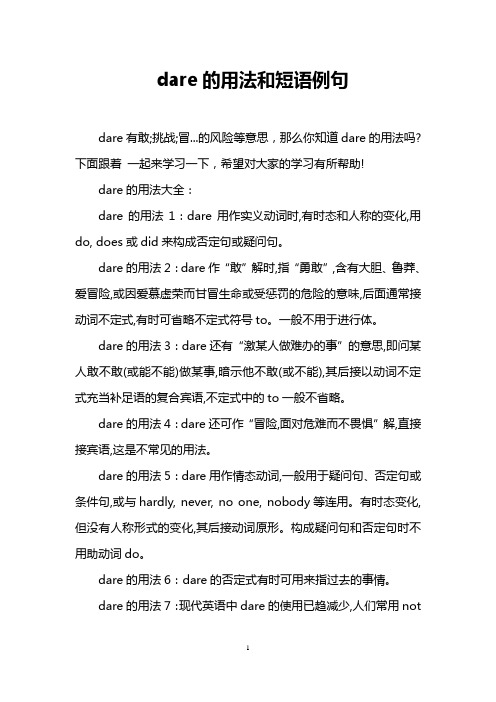
dare的用法和短语例句dare有敢;挑战;冒...的风险等意思,那么你知道dare的用法吗?下面跟着一起来学习一下,希望对大家的学习有所帮助!dare的用法大全:dare的用法1:dare用作实义动词时,有时态和人称的变化,用do, does或did来构成否定句或疑问句。
dare的用法2:dare作“敢”解时,指“勇敢”,含有大胆、鲁莽、爱冒险,或因爱慕虚荣而甘冒生命或受惩罚的危险的意味,后面通常接动词不定式,有时可省略不定式符号to。
一般不用于进行体。
dare的用法3:dare还有“激某人做难办的事”的意思,即问某人敢不敢(或能不能)做某事,暗示他不敢(或不能),其后接以动词不定式充当补足语的复合宾语,不定式中的to一般不省略。
dare的用法4:dare还可作“冒险,面对危难而不畏惧”解,直接接宾语,这是不常见的用法。
dare的用法5:dare用作情态动词,一般用于疑问句、否定句或条件句,或与hardly, never, no one, nobody等连用。
有时态变化,但没有人称形式的变化,其后接动词原形。
构成疑问句和否定句时不用助动词do。
dare的用法6:dare的否定式有时可用来指过去的事情。
dare的用法7:现代英语中dare的使用已趋减少,人们常用notto be afraid或not to have the courage to代替。
dare的用法8:表示“在激将法的鼓动下”用for a dare是英式英语用法,用on a dare是美式英语用法。
dare的常用短语:用作助动词(aux.)how dare...I dare sayyou dare〔don't you dare〕dare的用法例句:1. People always think I'm a fool, and I dare say they're right.人们总认为我是个傻瓜,想必他们是对的。
dare的用法和短语例句

【导语】dare有敢;挑战;冒...的风险等意思,那么你知道dare的⽤法吗?下⾯跟着⼀起来学习⼀下,希望对⼤家的学习有所帮助!【篇⼀】dare的⽤法 dare的⽤法1:dare⽤作实义动词时,有时态和⼈称的变化,⽤do, does或did来构成否定句或疑问句。
dare的⽤法2:dare作“敢”解时,指“勇敢”,含有⼤胆、鲁莽、爱冒险,或因爱慕虚荣⽽⽢冒⽣命或受惩罚的危险的意味,后⾯通常接动词不定式,有时可省略不定式符号to。
⼀般不⽤于进⾏体。
dare的⽤法3:dare还有“激某⼈做难办的事”的意思,即问某⼈敢不敢(或能不能)做某事,暗⽰他不敢(或不能),其后接以动词不定式充当补⾜语的复合宾语,不定式中的to⼀般不省略。
dare的⽤法4:dare还可作“冒险,⾯对危难⽽不畏惧”解,直接接宾语,这是不常见的⽤法。
dare的⽤法5:dare⽤作情态动词,⼀般⽤于疑问句、否定句或条件句,或与hardly, never, no one, nobody等连⽤。
有时态变化,但没有⼈称形式的变化,其后接动词原形。
构成疑问句和否定句时不⽤助动词do。
dare的⽤法6:dare的否定式有时可⽤来指过去的事情。
dare的⽤法7:现代英语中dare的使⽤已趋减少,⼈们常⽤not to be afraid或not to have the courage to代替。
dare的⽤法8:表⽰“在激将法的⿎动下”⽤for a dare是英式英语⽤法,⽤on a dare是美式英语⽤法。
【篇⼆】dare的常⽤短语 ⽤作助动词 (aux.) how dare... I dare say you dare〔don't you dare〕【篇三】dare的⽤法例句 1. People always think I'm a fool, and I dare say they're right. ⼈们总认为我是个傻⽠,想必他们是对的。
dare用法总结大全(汇编5篇)

dare用法总结大全(汇编5篇)dare用法总结大全第1篇dare的意思敢;敢做;激(某人做某事);问(某人)有没有胆识(做某事);敢;敢于;大胆;无畏于;敢,竟敢;dare的用法用作实义动词其意为“敢于”,可以有各种词形变化,可用于各类句型(确定句、否定句、疑问句等)。
如:Do you dare to tell him?你敢告知他吗?He doesnt dare to 他不敢插嘴。
用作情态动词其意思为“敢”,后接动词原形,通常只用于否定句或疑问句以及if或whether之后,一般不用于确定句。
如:She darent come to see 她不敢来见你。
Dare you say that to the boss?你敢向上司说这种话吗?I dont know whether he dare 我不知他是否敢试一试。
混合用法有时dare的实义动词用法和情态动词用法会混在一起,显现一些混合结构,这种用法尤其显现在否定句和疑问句中。
如:Did he dare tell her?他敢告知她吗?He didnt dare open his 他不敢把眼睛睁开。
第一句由于在句首使用了助动词did,说明句中的dare为实义动词,那么后面接另一动词时就应用带to不定式,所以它的“正确”表达应是:Did he dare to tell her?第二句由于在dare前使用了助动词didnt,说明其中的dare为实义动词,所以当后接另一动词时应当用带to不定式,所以这一句的“正确”表达应是:He didnt dare to open his这样的用法尽管我们阅读中可能会碰到,但最好不要仿照,由于假如考试中用它有可能会被判定为错误噢!I dare say前面我们讲过,dare用作情态动词通常不用于确定句,但是I dare say是个例外,并且它已成为一个习惯说法,用于表示一种不愿定的语气,它的意思是“很可能”“大约”“我想”等。
dare作情态动词的用法

dare作情态动词的用法一、dare作情态动词的基本用法Dare这个词在英语中既可以作为实义动词使用,表示“敢于”或“冒险”,也可以作为情态动词使用,表示某种责任、忌讳或挑战。
在本文中,我们将专注讨论dare 作为情态动词的用法。
1. 表示勇气和挑战当dare被用作情态动词时,它常常用来表示勇气和挑战,表达一种无畏面对某种困难或危险的意愿。
例如:a) I dare to climb this mountain.(我敢去攀登这座山。
)b) Do you dare to try the new roller coaster?(你敢尝试新的过山车吗?)在这些例句中,dare表示主观的决心和勇气去面对某种具有挑战性的事物。
2. 否定问句中的激将除了表达勇气和挑战外,dare还常常出现在否定问句中,带有一种激将他人做某事的意味。
例如:a) Why don't you dare to ask her out?(你为什么不敢约她出去?)b) Don't you dare say that again!(你敢再说一次试试!)这种用法带有一种挑衅和威胁的含义,用来强调他人缺乏勇气或胆量去面对某个问题或情境,从而促使对方行动。
二、dare作情态动词的构造和变化当dare被用作情态动词时,它具有特殊的构造和变化规则。
以下是几种常见的形式:1. 完成时态在完成时态中,dare作为情态动词通常与助动词“have”连用。
例如:a) She dares have told me a lie.(她敢对我说谎。
)b) Do you dare have eaten that whole pizza?(你敢吃完整个披萨吗?)这些例句中,“have”后跟过去分词形式,构成完成时态,表示前者曾经冒险做某件事情。
2. 否定形式当dare用于否定形式时,can或could的否定形式“can't/couldn't”可以用于强调不敢冒险去做某事。
dare的两种用法

dare的两种用法Dare的意思是“有勇气做某事”,它也有两种用法:dare 作实义动词* as an ordinary verb followed by an infinitive with to, with s in the third person singular and with questions and negatives formed with do:作为实义动词时,接带to的不定式,第三人称单数作主语时加s,疑问句和否定句用do来构成:He never dares to criticise her for wasting money and she doesn't dare to interrupt him when he's working.他从不敢批评她浪费钱,而她不敢打扰他工作。
dare 作情态动词作为情态助动词时,接不带to的不定式,第三人称单数作主语时不加s,疑问句和否定句不需要用do来构成:Dare she tell him what she thinks about him? She daren't say anything. He will only shout at her. "How dare you speak to me like that?" he will say.她敢告诉他她对他的想法吗?她什么也不敢说。
他只会对着她咆哮:“你怎敢那样对我说话?”他肯定会这么说。
比较Differences in use are not as fixed or clear cut between doesn't dare to and daren't as they are between doesn't need to and needn't, except in expressions or collocations such as:doesn't dare to与daren't在用法上的差别不像doesn't need to和needn't那么固定或清晰,除了在以下这些表达和搭配中:* How dare you?你怎么敢?eg: How dare you walk away when I'm talking to you?我在跟你说话的时候你怎么敢走开?* I dare you to…我谅你不敢……I dare you to go up to him and ask him for a date.我谅你也不敢走到他面前请他跟你约会。
怎么辨别实意动词和情态动词及举例详解

实义动词是具有实际词义的动词,用来单独作谓语。
情态动词具有一定的词义,但不能单独作谓语,只用于构成复合谓语,增加谓语的情态、语气等色彩。
如We must obey traffic regulations.我们必须遵守交通规则。
在这个句子中,obey 有实际的词汇意义,在句子中作谓语,它是实义动词。
must 有它的词义“必须”,但它不在句子中作谓语,只是帮助增加了句子中说话人的态度。
我们用dare这个单词来作说明dare的用法1) dare用作实义动词,此时其后的动词不定式可带to也可不带to,且dare有人称和数以及时态的变化。
例如: I dare to jump down from the top of the wall. 我敢从那墙头上跳下来。
She doesn't dare (to) meet her teacher's eyes. 她不敢与老师对视。
2) dare用作情态动词,后跟动词原形,主要用于疑问句、否定句和条件句中。
例如: How dare she do things like that to me? 她怎么敢对我做那种事? -Dare you catch the mouse? 你敢去抓那只老鼠吗? -I daren't do that. 我不敢抓。
If you dare say that to our teacher, I would vote for you. 如果你敢向我们的老师说那件事,我就投你一票。
dare的用法dare do sth: 且“dare”没有任何词形变化,情态动词dare to do sth: 且“dare”有词形变化,实义动词情态动词dare一般只用在疑问句或否定句,(情态动词dare不要用在陈述语气里) “敢或者有勇气”之意。
例 how dare you speak to me like that ..... (dare不跟to 用,跟动词例如speak)及物动词dare表示挑战,挑衅,尝试,例如 dare somebody to do sth (跟to 用)及物动词dare例如, He dared to do sth, 他敢于做, 上面的dare sb to do sth 是挑战别人做某事.不及物动词dare表示有足够的胆量勇气,后不加to或者名词或动词,例如 you wouldn't dare。
dare作情态动词和实义动词的用法区别
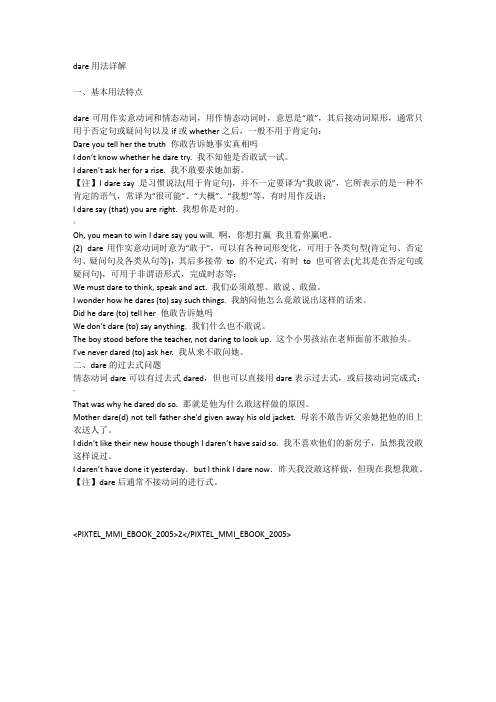
dare用法详解一、基本用法特点dare可用作实意动词和情态动词,用作情态动词时,意思是“敢”,其后接动词原形,通常只用于否定句或疑问句以及if或whether之后,一般不用于肯定句:Dare you tell her the truth 你敢告诉她事实真相吗I don’t know whether he dare try. 我不知他是否敢试一试。
I daren’t ask her for a rise. 我不敢要求她加薪。
【注】I dare say 是习惯说法(用于肯定句),并不一定要译为“我敢说”,它所表示的是一种不肯定的语气,常译为“很可能”、“大概”、“我想”等,有时用作反语:I dare say (that) you are right. 我想你是对的。
》Oh, you mean to win I dare say you will. 啊,你想打赢我且看你赢吧。
(2) dare用作实意动词时意为“敢于”,可以有各种词形变化,可用于各类句型(肯定句、否定句、疑问句及各类从句等),其后多接带to 的不定式,有时to 也可省去(尤其是在否定句或疑问句),可用于非谓语形式,完成时态等:We must dare to think, speak and act. 我们必须敢想、敢说、敢做。
I wonder how he dares (to) say such things. 我纳闷他怎么竟敢说出这样的话来。
Did he dare (to) tell her 他敢告诉她吗We don’t dare (to) say anything. 我们什么也不敢说。
The boy stood before the teacher, not daring to look up. 这个小男孩站在老师面前不敢抬头。
I’ve never dared (to) ask her. 我从来不敢问她。
二、dare的过去式问题情态动词dare可以有过去式dared,但也可以直接用dare表示过去式,或后接动词完成式:"That was why he dared do so. 那就是他为什么敢这样做的原因。
dare的两种用法
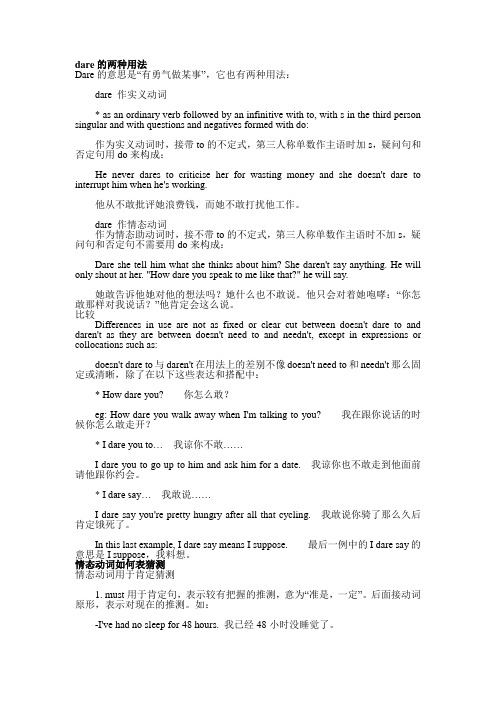
dare的两种用法Dare的意思是“有勇气做某事”,它也有两种用法:dare 作实义动词* as an ordinary verb followed by an infinitive with to, with s in the third person singular and with questions and negatives formed with do:作为实义动词时,接带to的不定式,第三人称单数作主语时加s,疑问句和否定句用do来构成:He never dares to criticise her for wasting money and she doesn't dare to interrupt him when he's working.他从不敢批评她浪费钱,而她不敢打扰他工作。
dare 作情态动词作为情态助动词时,接不带to的不定式,第三人称单数作主语时不加s,疑问句和否定句不需要用do来构成:Dare she tell him what she thinks about him? She daren't say anything. He will only shout at her. "How dare you speak to me like that?" he will say.她敢告诉他她对他的想法吗?她什么也不敢说。
他只会对着她咆哮:“你怎敢那样对我说话?”他肯定会这么说。
比较Differences in use are not as fixed or clear cut between doesn't dare to and daren't as they are between doesn't need to and needn't, except in expressions or collocations such as:doesn't dare to与daren't在用法上的差别不像doesn't need to和needn't那么固定或清晰,除了在以下这些表达和搭配中:* How dare you?你怎么敢?eg: How dare you walk away when I'm talking to you?我在跟你说话的时候你怎么敢走开?* I dare you to…我谅你不敢……I dare you to go up to him and ask him for a date.我谅你也不敢走到他面前请他跟你约会。
dare用法详解

一、基本用法特点dare可用实意动词和情态动词,用作情态动词时,意思是“敢”,其后接动词原形,通常只用于否定句或疑问句以及if或whether之后,一般不用于肯定句:Dare you tell her the truth? 你敢告诉她事实真相吗?I don’t know whether he dare try.我不知他是否敢试一试。
I daren’t ask her for a rise.我不敢要求她加薪。
【注】I dare say 是习惯说法(用于肯定句),并不一定要译为“我敢说”,它所表示的是一种不肯定的语气,常译为“很可能”、“大概”、“我想”等,有时用作反语:I dare say (that) you are right. 我想你是对的。
Oh, you mean to win? I dare say you will. 啊,你想打赢? 我且看你赢吧。
(2) dare用作实意动词时意为“敢于”,可以有各种词形变化,可用于各类句型(肯定句、否定句、疑问句及各类从句等),其后多接带 to 的不定式,有时 to 也可省去(尤其是在否定句或疑问句),可用于非谓语形式,完成时态等:We must dare to think, speak and act. 我们必须敢想、敢说、敢做。
I wonder how he dares (to) say such things. 我纳闷他怎么竟敢说出这样的话来。
Did he dare (to) tell her? 他敢告诉她吗?We don’t dare (to) say anything.我们什么也不敢说。
The boy stood before the teacher, not daring to look up. 这个小男孩站在老师面前不敢抬头。
I’ve never dared (to) ask her.我从来不敢问她。
二、dare的过去式问题情态动词dare可以有过去式dared,但也可以直接用dare表示过去式,或后接动词完成式:That was why he dared do so. 那就是他为什么敢这样做的原因。
dare可做情态动词也可做实义动词

dare 可做情态动词也可做实义动词1.Dare作情态动词时,主要用于疑问句、否定句和条件从句中,一般不用在肯定句中。
如:How dare you say I'm unfair.He daren't speak English before such a crowd, dare he?2.dare也常用作实义动词,有时态、人称和数的变化,所不同的是,作实义动词时,在肯定句中,dare后面通常接带to的不定式,在否定和疑问句中,dare后面可接带to或不带to 的不定式。
如:I dare to swim across this river.He does not dare (to) answer.Don't you dare (to) touch it!I wondered he dare (to) say that.He needs to finish it this evening.dare not to 中dare为情态动词.don't/doesn't/didn't dare to中dare是实意动词.don't用在第一人称第二人称现在式中.doesn't用在第三人称现在式.didn't用在过去式中.都是“敢”的意思,只是用法不同,语气不同。
情态动词所表达的感情色彩更强,实意动词更强调客观,当然,这只是细微的差别,主要还是用法不同dare用作情态动词时,表示“敢于”这个意思,主要用于疑问句、否定句及条件从句。
【例如】Dare you go home alone?Tom dare not gosintosthe haunted house.How dare you say such a thing to your father!I won't allow you to swim across the river, even if you dare do it. The current is too swift.但在现代英语中dare, need一样用作及物动词的时候更多一些,后面可以跟不定式,用于各种结构中。
dare的用法总结

千里之行,始于足下。
dare的用法总结
Dare的用法总结如下:
1. 作为情态动词:
- 表示“敢”或“竟敢”,多用于否定句或疑问句中。
- 例句:He didn't dare to tell her.(他不敢告诉她。
)
- 例句:Dare you jump off the cliff?(你敢跳下悬崖吗?)
2. 作为实义动词:
- 表示“敢”、“冒险”或“勇敢面对”,常与不定式或动词不定式连用。
- 例句:She dared to speak up against the injustice.(她敢公
然反对不公正。
)
- 例句:I dare not imagine what could happen.(我不敢想象会发生什么。
)
3. 作为名词:
- 表示“敢于冒险或挑战的行为”。
- 例句:She took a dare and went skydiving.(她冒险去跳伞了。
)
4. 作为形容词:
- 表示“勇敢的”或“敢冒险的”。
- 例句:He is a dare devil and loves extreme sports.(他是个
敢冒险的人,热爱极限运动。
)
需要注意的是,作为情态动词时,dare后接动词原形而不加to。
而作为实义动词时,通常需要加to。
例如:She doesn't dare to try it again.(她
不敢再尝试了。
)
第1页/共1页。
dare的两种用法

dare的两种用法Dare的意思是“有勇气做某事”,它也有两种用法: dare 作实义动词 * as an ordinary verb followed by an infinitive with to, with s in the third person singular and with questions and negatives formed with do: 作为实义动词时,接带to的不定式,第三人称单数作主语时加s,疑问句和否定句用do来构成: He never dares to criticise her for wasting money and she doesn't dare to interrupt him when he's working. 他从不敢批评她浪费钱,而她不敢打扰他工作。
dare 作情态动词 作为情态助动词时,接不带to的不定式,第三人称单数作主语时不加s,疑问句和否定句不需要用do来构成: Dare she tell him what she thinks about him? She daren't say anything. He will only shout at her. "How dare you speak to me like that?" he will say. 她敢告诉他她对他的想法吗?她什么也不敢说。
他只会对着她咆哮:“你怎敢那样对我说话?”他肯定会这么说。
比较 Differences in use are not as fixed or clear cut between doesn't dare to and daren't as they are between doesn't need to and needn't, except in expressions or collocations such as: doesn't dare to与daren't在用法上的差别不像doesn't need to和needn't 那么固定或清晰,除了在以下这些表达和搭配中: * How dare you? 你怎么敢? eg: How dare you walk away when I'm talking to you? 我在跟你说话的时候你怎么敢走开? * I dare you to… 我谅你不敢…… I dare you to go up to him and ask him for a date. 我谅你也不敢走到他面前请他跟你约会。
高中英语破题致胜微方法(情态动词系列)身兼两职的情态动词-need和dare
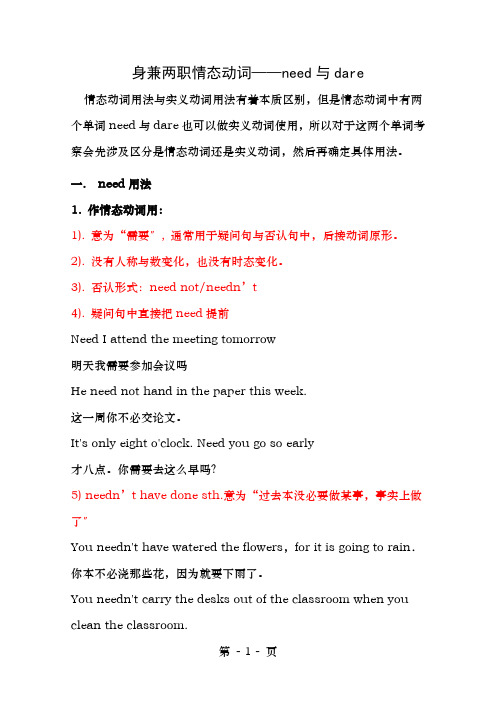
身兼两职情态动词——need与dare情态动词用法与实义动词用法有着本质区别,但是情态动词中有两个单词need与dare也可以做实义动词使用,所以对于这两个单词考察会先涉及区分是情态动词还是实义动词,然后再确定具体用法。
一. need用法1. 作情态动词用:1). 意为“需要〞, 通常用于疑问句与否认句中,后接动词原形。
2). 没有人称与数变化,也没有时态变化。
3). 否认形式:need not/needn’t4). 疑问句中直接把need提前Need I attend the meeting tomorrow明天我需要参加会议吗He need not hand in the paper this week.这一周你不必交论文。
It's only eight o'clock. Need you go so early才八点。
你需要去这么早吗?5) needn’t have done sth.意为“过去本没必要做某事,事实上做了〞You needn't have watered the flowers,for it is going to rain.你本不必浇那些花,因为就要下雨了。
You needn't carry the desks out of the classroom when you clean the classroom.你清扫教室时不必把桌子搬到教室外。
You needn't have bought such a big TV as it takes too much room.你本来不必买这么大电视,它占据空间太大了〔而事实上已经买了〕。
2. 作实义动词用:1).有人称,数与时态变化;2).意为"需要;必要",后面可接名词、动名词或动词不定式等作宾语;I need a dictionary, so I need to go to the bookstore.我需要一本词典,因此我要去趟书店。
dare作助动词如何造句

dare作助动词如何造句摘要:一、什么是dare 作助动词1.dare 作为情态动词的用法2.dare 作为实义动词的用法二、dare 作助动词的疑问句和否定句形式1.疑问句形式2.否定句形式三、dare 作助动词的造句实例1.用于肯定句2.用于疑问句3.用于否定句正文:dare 作助动词如何造句?首先我们需要了解什么是dare 作助动词。
dare 是一个常用的英语情态动词,表示“敢”或“敢于”。
在英语中,dare 可以用作助动词,也可以用作实义动词。
作为情态动词,dare 表示说话人对某事发生的可能性或某人做某事的能力表示怀疑、惊讶、不满等情感。
例如:- You dare to touch me?(你敢碰我吗?)作为实义动词,dare 表示敢于或敢于做某事。
例如:- She dared to challenge the authority.(她敢于挑战权威。
)了解了dare 作助动词的基本用法后,我们来看一下dare 作助动词的疑问句和否定句形式。
1.疑问句形式:在dare 作助动词的疑问句中,通常要将dare 放在句首,后面跟动词原形。
例如:- Dare you leave me alone?(你敢让我一个人呆着吗?)2.否定句形式:在dare 作助动词的否定句中,通常要在dare 前面加上don"t 或doesn"t,后面跟动词原形。
例如:- Don"t dare to touch my things!(别敢动我的东西!)了解了dare 作助动词的疑问句和否定句形式后,我们来看一下dare 作助动词的造句实例。
1.用于肯定句:- She dared to speak out against the injustice.(她敢于公开反对不公正。
)- He dared to climb the highest mountain in the world.(他敢于攀登世界上最高的山峰。
dare在句子中的用法.doc
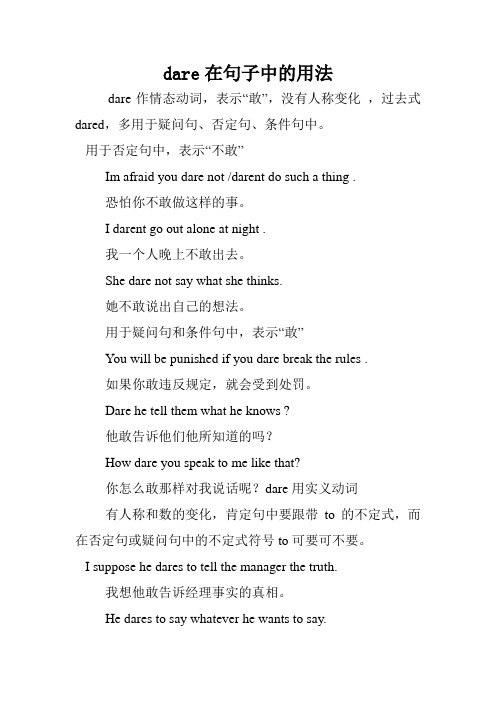
dare在句子中的用法dare作情态动词,表示“敢”,没有人称变化,过去式dared,多用于疑问句、否定句、条件句中。
用于否定句中,表示“不敢”Im afraid you dare not /darent do such a thing .恐怕你不敢做这样的事。
I darent go out alone at night .我一个人晚上不敢出去。
She dare not say what she thinks.她不敢说出自己的想法。
用于疑问句和条件句中,表示“敢”You will be punished if you dare break the rules .如果你敢违反规定,就会受到处罚。
Dare he tell them what he knows ?他敢告诉他们他所知道的吗?How dare you speak to me like that?你怎么敢那样对我说话呢?dare用实义动词有人称和数的变化,肯定句中要跟带to的不定式,而在否定句或疑问句中的不定式符号to可要可不要。
I suppose he dares to tell the manager the truth.我想他敢告诉经理事实的真相。
He dares to say whatever he wants to say.只要他想说的,他就敢说。
This student doesntdare (to)raise any questions in class.在课堂上,这个学生不敢提出任何问题。
Do youdare (to)drive a car on such a crowded road ?你敢在这么拥挤的街道上开车吗?I do notdare (to)complain.=I dare not complain.我不敢抱怨。
Do youdare (to)swim in the river?=Dare you swim in the river?你敢在河里游泳吗?---小知识---I dare say 或I daresay 已成为习惯说法,它的意思由于经常使用已经弱化为“我认为,我想”,只用于第一人称单数和一般现在时。
- 1、下载文档前请自行甄别文档内容的完整性,平台不提供额外的编辑、内容补充、找答案等附加服务。
- 2、"仅部分预览"的文档,不可在线预览部分如存在完整性等问题,可反馈申请退款(可完整预览的文档不适用该条件!)。
- 3、如文档侵犯您的权益,请联系客服反馈,我们会尽快为您处理(人工客服工作时间:9:00-18:30)。
dare用法详解
一、基本用法特点
dare可用作实意动词和情态动词,用作情态动词时,意思是“敢”,其后接动词原形,通常只用于否定句或疑问句以及if或whether之后,一般不用于肯定句:
Dare you tell her the truth 你敢告诉她事实真相吗
I don’t know whether he dare try. 我不知他是否敢试一试。
I daren’t ask her for a rise. 我不敢要求她加薪。
【注】I dare say 是习惯说法(用于肯定句),并不一定要译为“我敢说”,它所表示的是一种不肯定的语气,常译为“很可能”、“大概”、“我想”等,有时用作反语:
I dare say (that) you are right. 我想你是对的。
Oh, you mean to win I dare say you will. 啊,你想打赢我且看你赢吧。
(2) dare用作实意动词时意为“敢于”,可以有各种词形变化,可用于各类句型(肯定句、否定句、疑问句及各类从句等),其后多接带 to 的不定式,有时 to 也可省去(尤其是在否定句或疑问句),可用于非谓语形式,完成时态等:
We must dare to think, speak and act. 我们必须敢想、敢说、敢做。
I wonder how he dares (to) say such things. 我纳闷他怎么竟敢说出这样的话来。
Did he dare (to) tell her 他敢告诉她吗
We don’t dare (to) say anything. 我们什么也不敢说。
The boy stood before the teacher, not daring to look up. 这个小男孩站在老师面前不敢抬头。
I’ve never dared (to) ask her. 我从来不敢问她。
二、dare的过去式问题
情态动词dare可以有过去式dared,但也可以直接用dare表示过去式,或后接动词完成式:That was why he dared do so. 那就是他为什么敢这样做的原因。
Mother dare(d) not tell father she’d given away his old jacket. 母亲不敢告诉父亲
她把他的旧上衣送人了。
I didn’t like their new house though I daren’t have said so. 我不喜欢他们的新房子,虽然我没敢这样说过。
I daren’t have done it yesterday.but I think I dare now.昨天我没敢这样做,但现在我想我敢。
【注】dare后通常不接动词的进行式。
<PIXTEL_MMI_EBOOK_2005>2
</PIXTEL_MMI_EBOOK _2005>。
